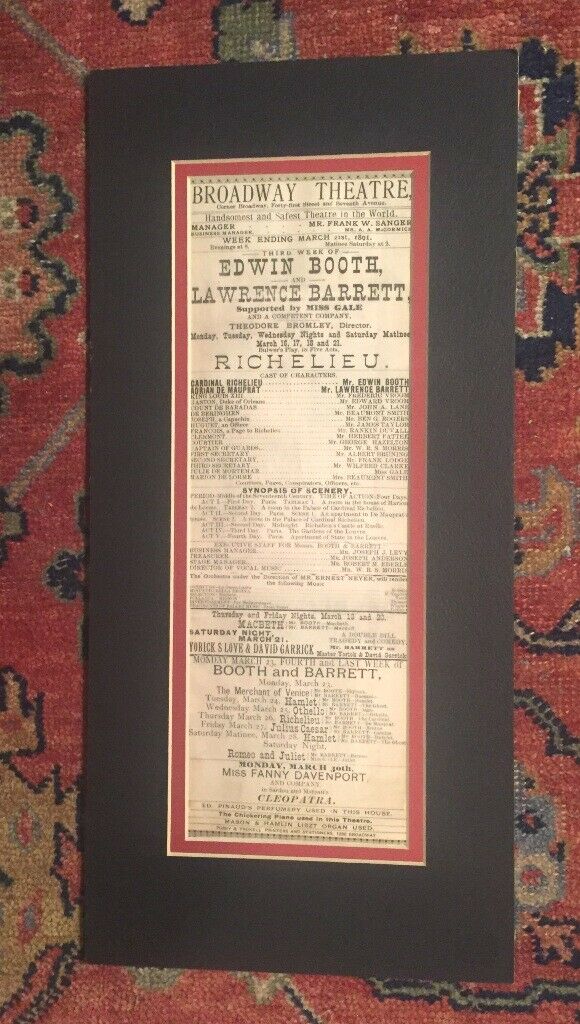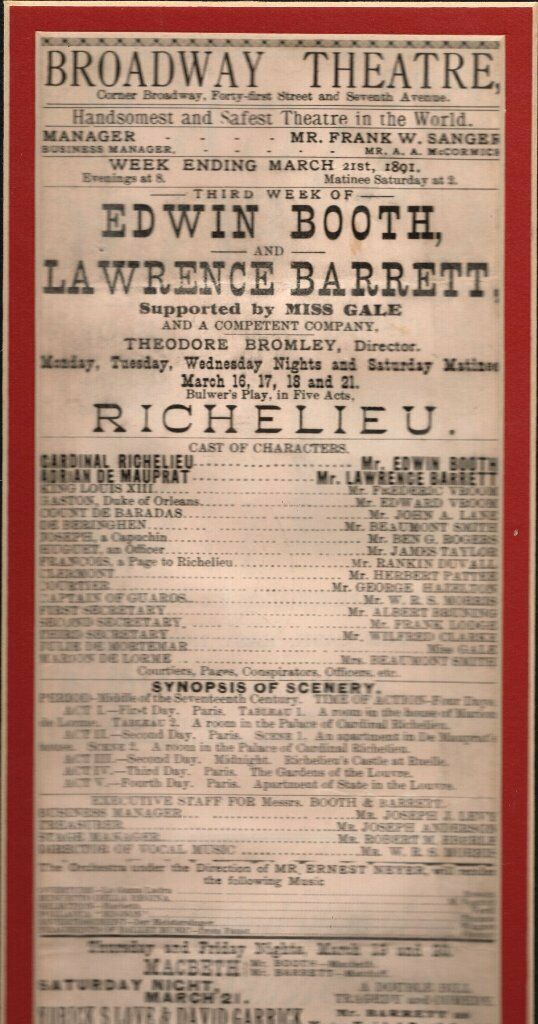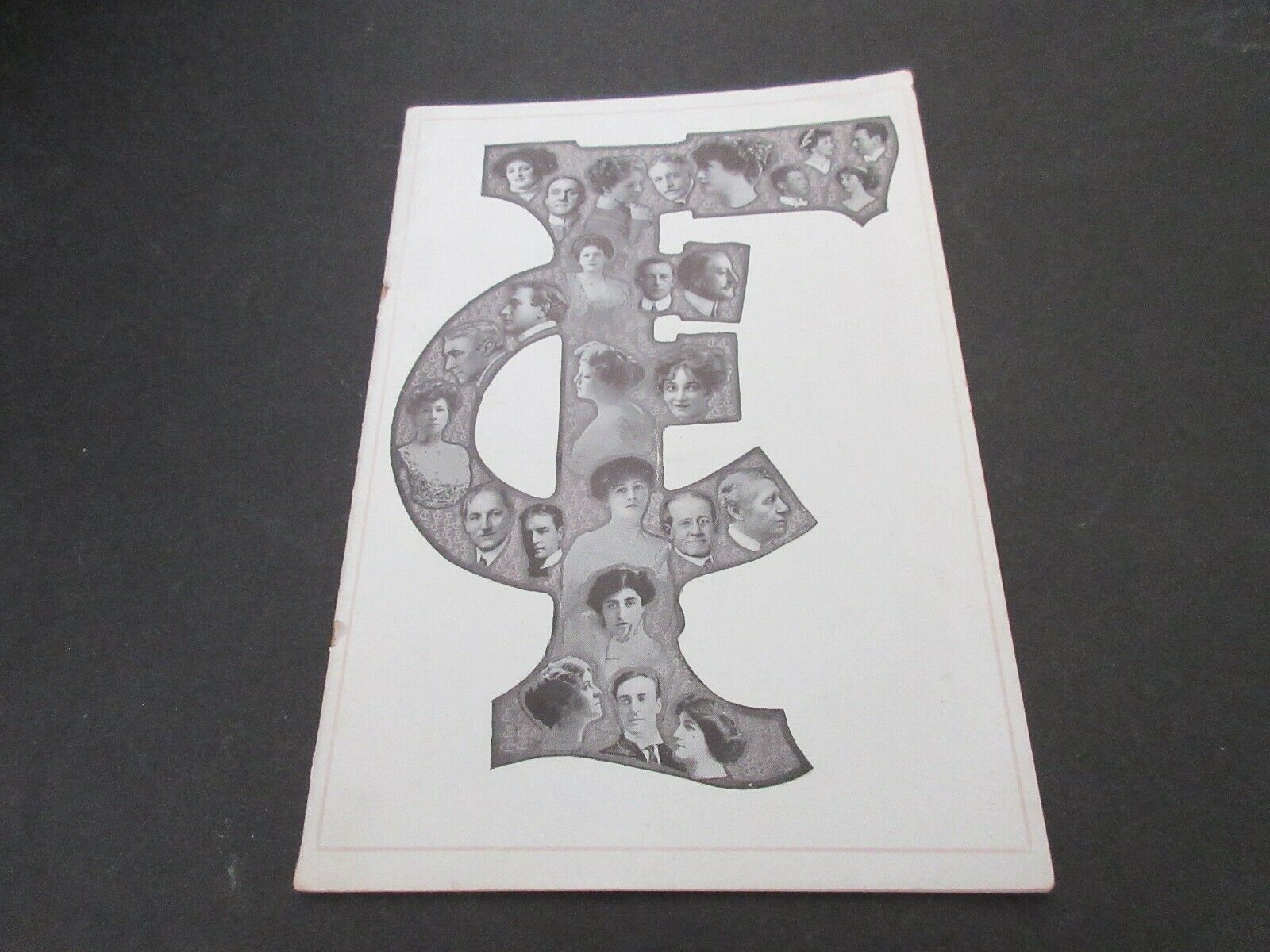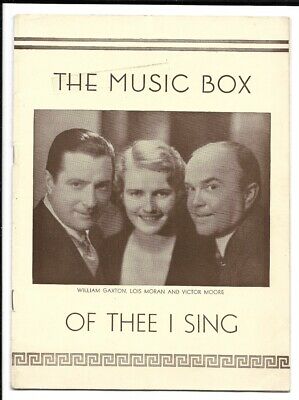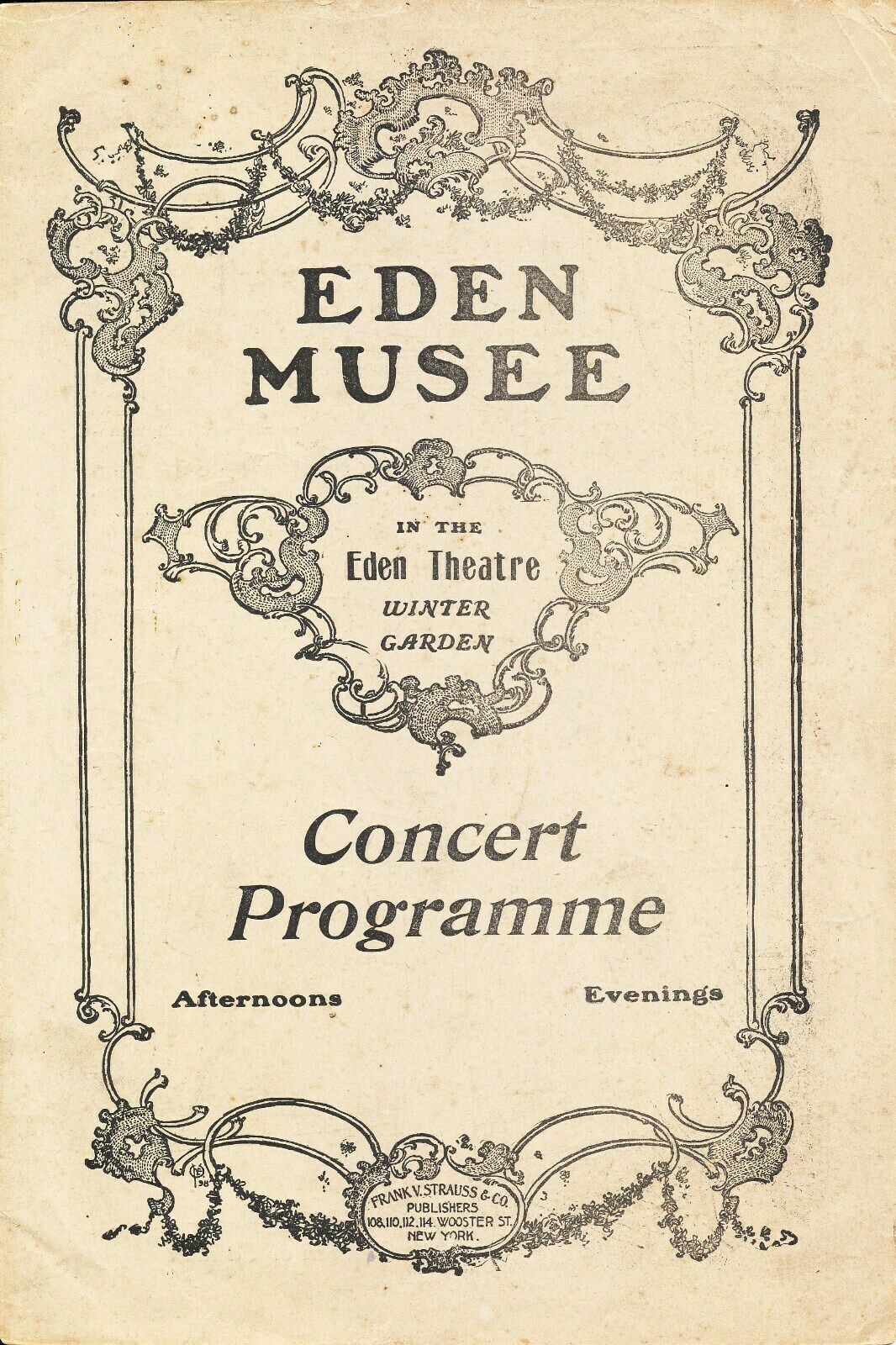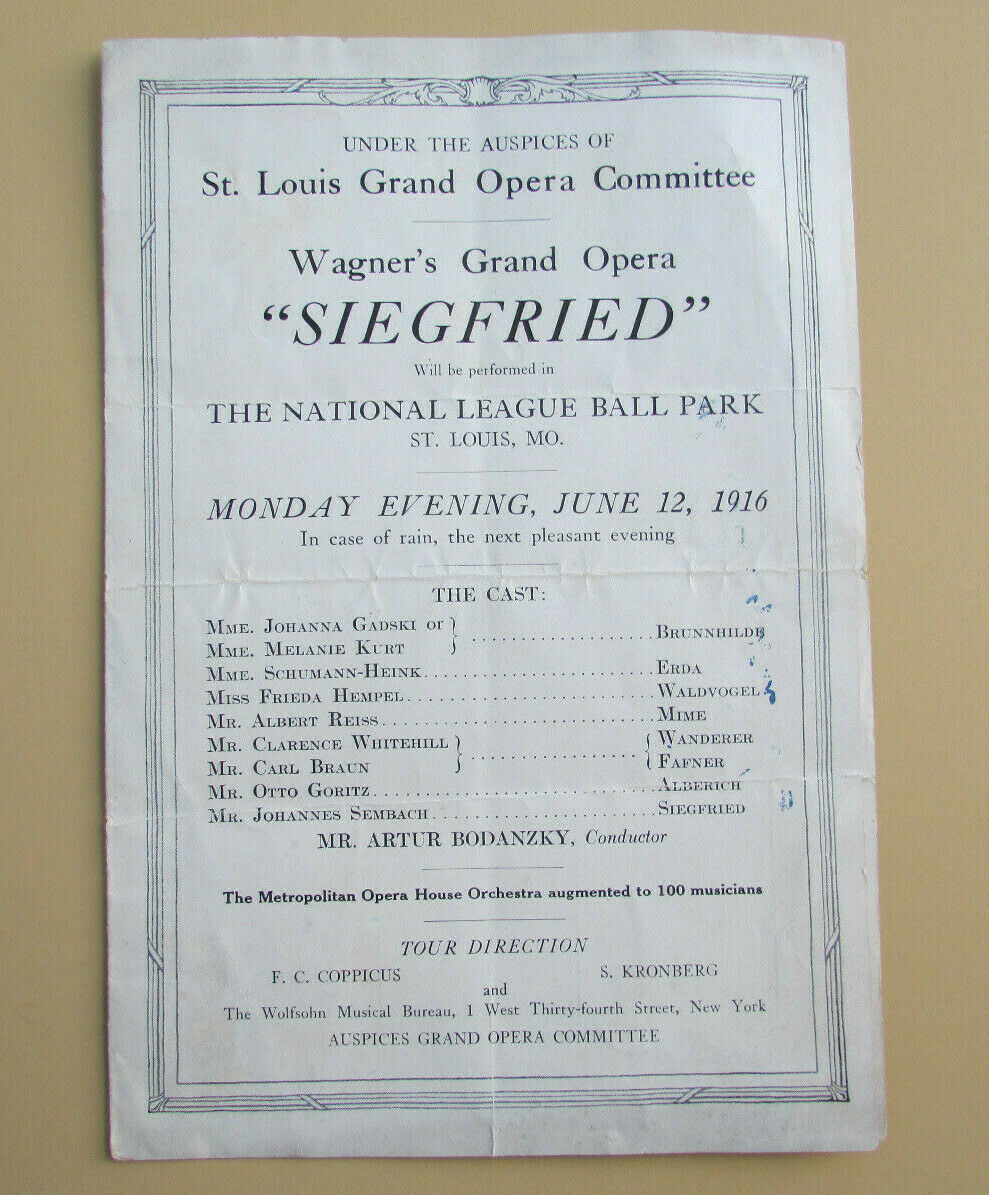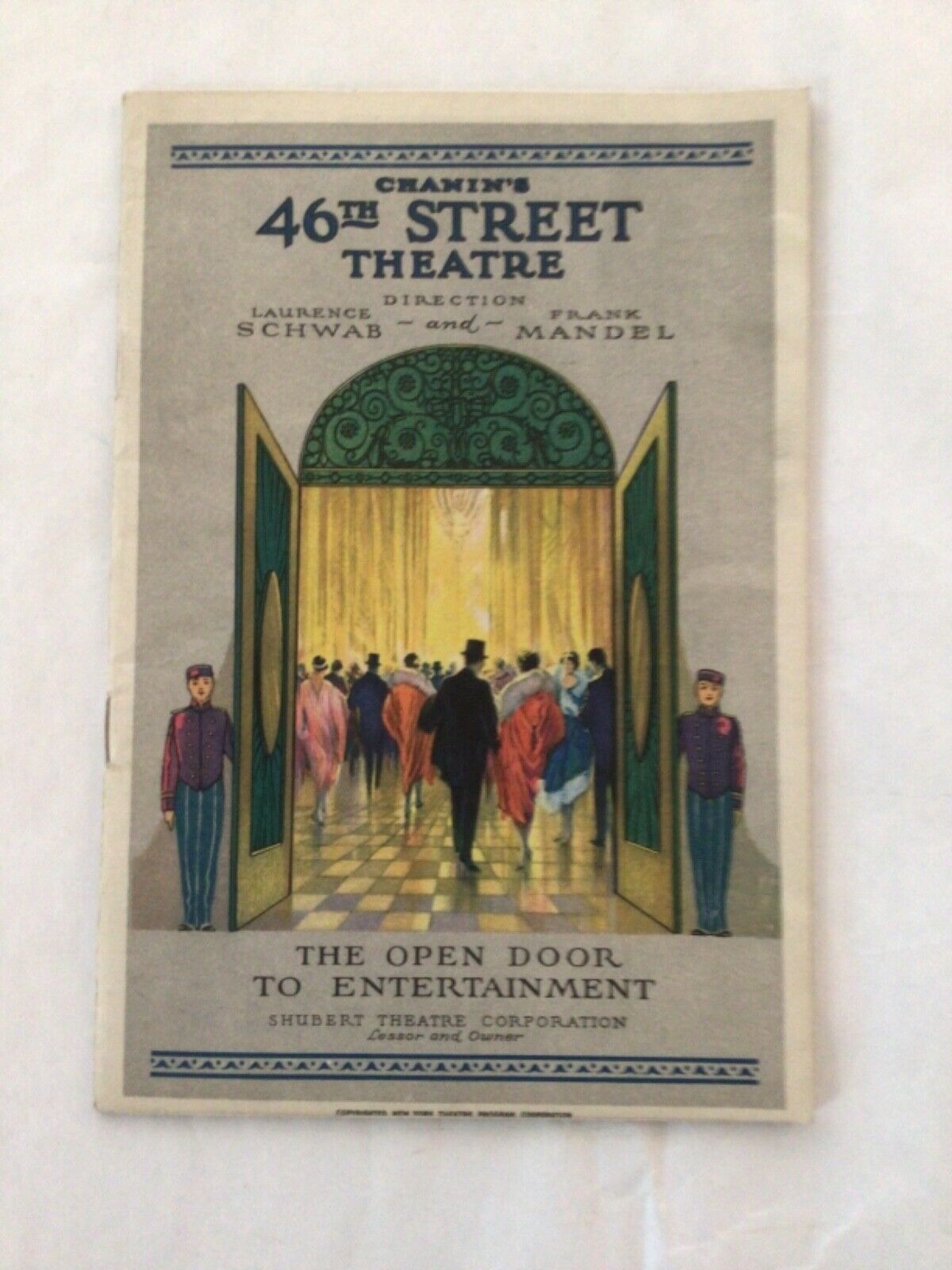-40%
*EDWIN BOOTH RARE LARGE 1891 DOUBLE MATTED FAREWELL TO THE STAGE BROADSIDE*
$ 147.83
- Description
- Size Guide
Description
A rare large original March 21, 1891 broadside, handsomely double matted for display in black and red, for Edwin Booth's final stage engagement in Manhattan. Booth retired from the stage two weeks later at the Brooklyn Academy of Music. Lawrence Barrett is billed as sharing the stage with Booth, but alas, he didn't. He died the day before on March 20. This was probably the last bill to list Lawrence Barrett. Booth carried on without his partner for the next two weeks and then ended his illustrious stage career. Dimensions seventeen by eight inches, with broadside twelve and a half by four and a half inches. Light wear otherwise fine. An extraordinary display piece of the greatest actor America has ever known. See Edwin Booth and and the Booth family's extraordinary biographies below.Shipping discounts for multiple purchases. Credit cards accepted with Paypal. Inquiries always welcome. Please visit my other eBay items for more early theatre and historical autographs, photographs and programs and great singer, actor, and actress cabinet photos and CDV's.
From Wikipedia:
The
Booth family
was an
English American
theatrical family of the 19th century. Its most famous and well known members were
Edwin Booth
, one of the leading actors of his day, and
John Wilkes Booth
, who assassinated
Abraham Lincoln
.
The patriarch was
Junius Brutus Booth
, a
London
-born lawyer's son who eventually became an actor after he attended a production of
Othello
at the
Covent Garden theatre
. The prospects of fame, fortune, and freedom were very appealing to young Booth, and he displayed remarkable talent from an early age, deciding on a career in the theatre by the age of 17. He performed roles in several small theaters throughout England, and joined a tour of the Low Countries in 1814, returning the following year to make his London debut.
Booth abandoned his wife and their young son in 1821 and ran off to the United States with Mary Ann Holmes, a London flower girl. They settled on some 150 acres in Harford County near Baltimore and started a family; they had 10 children, six of whom survived to adulthood.
[1]
[2]
Junius Sr. and Edwin toured in California during the
Gold Rush
.
[
citation needed
]
Edwin bought an interest in the
Winter Garden Theatre
at 667 Broadway in
New York City
together with his brother-in-law
John Sleeper Clarke
. The brothers John Wilkes, Edwin, and Junius Brutus, Jr. performed there in the play
Julius Caesar
at a benefit in 1864, the only time they were seen together on a stage, playing Mark Antony, Brutus, and Cassius, respectively.
Junius Brutus Booth
(1796–1852) brought his
mistress
Mary Ann Holmes, who bore him 10 children, to the United States.
He also wrote many letters in fits of drunken anger and madness to President Andrew Jackson threatening assassination. He requested that two prisoners who had been sentenced to death for piracy, named De Ruiz and De Soto, be pardoned, else: "I will cut your throat whilst you are sleeping." This letter would later be recanted by Junius, stating, "May god preserve General Jackson and this happy republic."
[4]
Junius Brutus Booth Jr.
(1821–1883) was married to
Agnes Booth
. Junius Jr. never achieved the same fame as his brothers, but his third wife Agnes was popular.
Their son Sydney Barton Booth (1877–1937) was an actor well into the era of modern film
[5]
Edwin Thomas Booth
(1833–1893) came to be the foremost American Shakespearean actor of his day. He founded
The Players
, a
New York City
actors' club which continues to the present day.
Edwin's grandson Edwin Booth Grossman was a painter of some note.
Asia Frigga Booth
(1835–1888) married John Sleeper Clarke, an actor/comedian who was briefly imprisoned in the aftermath of the assassination. They then emigrated to Britain, where he became a successful theatre manager.
Creston Clarke
[6]
and Wilfred Clarke,
[7]
sons of John and Asia, were noted actors in their day.
John Wilkes Booth
(1838–1865) was a popular young star in less serious fare than his brothers.
A
Confederate
sympathizer during the
American Civil War
, during a play attended by
Abraham Lincoln
, Booth took advantage of his access to the theatre to invade the President's box and
assassinate
the President. He was killed 12 days later by
Union
soldier Boston Corbett
Edwin Thomas Booth
(November 13, 1833 – June 7, 1893) was an American actor who toured throughout the United States and the major capitals of Europe, performing
Shakespearean
plays. In 1869, he founded
Booth's Theatre
in New York.
[2]
Some theatrical historians consider him the greatest American actor, and the greatest
Prince Hamlet
, of the 19th century.
[3]
His achievements are often overshadowed by his relationship with his younger brother, actor
John Wilkes Booth
, who
assassinated
President Abraham Lincoln.
Booth was born in
Bel Air, Maryland
, into the
Anglo-American
theatrical
Booth family
. He was the son of the famous actor,
Junius Brutus Booth
, an Englishman, who named Edwin after
Edwin Forrest
and
Thomas Flynn
, two of Junius' colleagues. He was the elder brother of
John Wilkes Booth
, himself a successful actor who gained notoriety as the
assassin
of President Lincoln.
Nora Titone, in her book
My Thoughts Be Bloody
, recounts how the shame and ambition of
Junius Brutus Booth
's three actor sons,
Junius Brutus Booth, Jr.
(who never achieved the stage stardom of his two younger actor brothers), Edwin Booth, and John Wilkes Booth, spurred them to strive, as rivals, for achievement and acclaim—Edwin, a
Unionist
, and John Wilkes, a Confederate and the assassin of Abraham Lincoln.
[4]
Career
In early appearances, Booth usually performed alongside his father, making his stage debut as Tressel or Tressil in
Colley Cibber
's version of
Richard III
in
Boston
on September 10, 1849. His first appearance in
New York City
was in the character of Wilford in
The Iron Chest
, which he played at the
National Theatre
in Chatham Street, on the 27th of September 1850. A year later, on the illness of the father, the son took his place in the character of Richard III.
[5]
After his father's death in 1852, Booth went on a worldwide tour, visiting
Australia
and
Hawaii
, and finally gaining acclaim of his own during an engagement in
Sacramento, California
, in 1856.
[6]
Before his brother
assassinated
Lincoln, Edwin had appeared with his two brothers, John Wilkes and Junius Brutus Booth Jr., in
Julius Caesar
in 1864.
[7]
John Wilkes played
Marc Antony
, Edwin played
Brutus
, and Junius played
Cassius
.
[8]
It was a benefit performance, and the only time that the three brothers appeared together on the same stage.
[9]
The funds were used to erect a
statue of William Shakespeare
that still stands in
Central Park
just south of the Promenade. Immediately afterwards, Edwin Booth began a production of
Hamlet
on the same stage, which came to be known as the "hundred nights
Hamlet
", setting a record that lasted until
John Barrymore
broke the record in 1922, playing the
title character
for 101 performances.
From 1863 to 1867, Booth managed the
Winter Garden Theatre
in New York City, mostly staging Shakespearean
tragedies
. In 1863, he bought the
Walnut Street Theatre
in
Philadelphia
.
[10]
After John Wilkes Booth's assassination of President Lincoln in April 1865, the infamy associated with the Booth name forced Edwin Booth to abandon the stage for many months. Edwin, who had been feuding with John Wilkes before the assassination, disowned him afterward, refusing to have John's name spoken in his house.
[11]
He made his return to the stage at the Winter Garden Theatre in January 1866, playing the title role in
Hamlet
,
[6]
which would eventually become his signature role.
Acting style
Edwin's acting style was distinctly different from that of his father. While the senior Booth was, like his contemporaries
Edmund Kean
and
William Charles Macready
, strong and bombastic, favoring characters such as Richard III, Edwin played more
naturalistically
, with a quiet, more thoughtful delivery, tailored to roles like Hamlet.
Later life
Booth was married to Mary Devlin from 1860 to 1863, the year of her death. They had one daughter, Edwina, born on December 9, 1861, in
London
. He later remarried, wedding his acting partner Mary McVicker in 1869, and became a widower again in 1881.
Edwin Booth with daughter Edwina,
circa
1864
Portrait of Edwin Booth
by John Singer Sargent, 1890, which hung at The Players clubhouse. Now in the collection of the
Amon Carter Museum of American Art
.
In 1869, Edwin acquired his brother John's body after repeatedly writing to President
Andrew Johnson
pleading for it. Johnson finally released the remains, and Edwin had them buried, unmarked, in the family plot at
Green Mount Cemetery
in
Baltimore
.
In 1888, Booth founded
The Players
, a private club for performing, literary, and visual artists and their supporters, and dedicated his home on
Gramercy Park
to it.
His final performance was, fittingly, in his signature role of Hamlet, in 1891 at the
Brooklyn Academy of Music
.
Robert Lincoln rescue
Edwin Booth saved Abraham Lincoln's son,
[12]
Robert
, from serious injury or even death. The incident occurred on a train platform in
Jersey City
,
New Jersey
. The exact date of the incident is uncertain, but it is believed to have taken place in late 1864 or early 1865. Robert Lincoln recalled the incident in a 1909 letter to Richard Watson Gilder, editor of
The Century Magazine
.
The incident occurred while a group of passengers were late at night purchasing their sleeping car places from the conductor who stood on the station platform at the entrance of the car. The platform was about the height of the car floor, and there was of course a narrow space between the platform and the car body. There was some crowding, and I happened to be pressed by it against the car body while waiting my turn. In this situation the train began to move, and by the motion I was twisted off my feet, and had dropped somewhat, with feet downward, into the open space, and was personally helpless, when my coat collar was vigorously seized and I was quickly pulled up and out to a secure footing on the platform. Upon turning to thank my rescuer I saw it was Edwin Booth, whose face was of course well known to me, and I expressed my gratitude to him, and in doing so, called him by name.
Booth did not know the identity of the man whose life he had saved until some months later, when he received a letter from a friend, Colonel
Adam Badeau
, who was an officer on the staff of General
Ulysses S. Grant
. Badeau had heard the story from Robert Lincoln, who had since joined the Union Army and was also serving on Grant's staff. In the letter, Badeau gave his compliments to Booth for the heroic deed. The fact that he had saved the life of Abraham Lincoln's son was said to have been of some comfort to Edwin Booth following his brother's assassination of the president.
Statue of Booth as
Hamlet
,
Gramercy Park
by
Edmond T. Quinn
,
circa
1916
Booth's Theatre
Booth's Theatre
Playbill of his
Richard III
circa
1872
In 1867, a fire damaged the Winter Garden Theatre, resulting in the building's subsequent demolition. Afterwards, Booth built his own theatre, an elaborate structure called
Booth's Theatre
in
Manhattan
, which opened on February 3, 1869, with a production of
Romeo and Juliet
starring Booth as
Romeo
, and Mary McVicker as
Juliet
. Elaborate productions followed, but the theatre never became a profitable or even stable financial venture. The
panic of 1873
caused the final
bankruptcy
of Booth's Theatre in 1874. After the bankruptcy, Booth went on another worldwide tour, eventually regaining his fortune.
Death
Edwin Booth had a small stroke in 1891, which precipitated his decline. He suffered another stroke in April 1893 and died June 7, 1893, in his apartment in The Players clubhouse. He was buried next to his first wife at
Mount Auburn Cemetery
in
Cambridge, Massachusetts
. His bedroom in the club has been kept untouched since his death.
[13]
The New York Times
reported his death.
[14]
Exhumation request
In December 2010, descendants of Edwin Booth reported that they obtained permission to exhume the Shakespearean actor's body to obtain
DNA
samples to compare with a sample of his brother John's DNA to refute the rumor he had escaped after the assassination. However, Bree Harvey, a spokesperson from the Mount Auburn Cemetery in Cambridge, Massachusetts, where Edwin Booth is buried, denied reports that the family had contacted them and requested to exhume Edwin's body.
[15]
The family hopes to obtain DNA samples from artifacts belonging to John Wilkes, or from remains such as vertebrae stored at the
National Museum of Health and Medicine
in Maryland.
[16]
[17]
On March 30, 2013, museum spokesperson Carol Johnson announced that the family's request to extract DNA from the vertebrae had been rejected.
[18]
Dramatizations
A number of modern dramatizations have been made of Edwin Booth's life, on both stage and screen. One of the best known is the 1955 film
Prince of Players
written by
Moss Hart
, based loosely on the popular book of that name by Eleanor Ruggles. It was directed by Philip Dunne and stars
Richard Burton
and
Raymond Massey
as Edwin and Junius Brutus Booth, Sr., with
Charles Bickford
and
Eva Le Gallienne
, the latter of whom plays Gertrude to Burton's Hamlet. The film depicts events in Booth's life well before, and then surrounding, the assassination of Lincoln by Booth's younger brother.
[19]
The opening scenes of
Prince of Players
are very similar to scenes in the earlier 1946
John Ford
western
My Darling Clementine
. In that movie, the character of Granville Thorndyke (as acted by
Alan Mowbray
) is an obvious nod to Booth's father
Junius
, and the scenes portray essentially the same sequence where the great actor has to be retrieved from a bar and dragged back to the theatre where he is overdue to give a performance in front of a restless audience.
[20]
[21]
The Brothers BOOTH!
, by W. Stuart McDowell, which focuses on the relationships of the three Booth brothers leading up to the assassination of Lincoln, was workshopped and given a series of staged readings featuring
David Strathairn
,
David Dukes
,
Angela Goethals
,
Maryann Plunkett
, and
Stephen Lang
at the New Harmony Project,
[22]
and at
The Guthrie Theatre
Lab in
Minneapolis
, and later presented in New York at the Players' Club, the
Second Stage Theatre
, and the
Boston Athenaeum
. It was given its first fully staged professional production at the Bristol Riverside Theatre outside Philadelphia in 1992.
[23]
[24]
[25]
A second play by the same name,
The Brothers Booth
, which focuses on "the world of the 1860s theatre and its leading family"
[26]
was written by Marshell Bradley and staged in New York at the Perry Street Theatre in 2004.
Oliver Ingraham Lay
: Edwin Booth as Hamlet, 1887
Austin Pendleton
's play,
Booth
, which depicts the early years of the brothers Edwin, Junius, and John Wilkes Booth and their father, was produced
off Broadway
at the York Theatre, starring
Frank Langella
as Junius Brutus Booth, Sr. In a review, the play was called "a psychodrama about the legendary theatrical family of the 19th century" by
The New York Times
.
[27]
Pendleton had adapted this version from his earlier work,
Booth Is Back
, produced at
Long Wharf Theatre
in
New Haven, Connecticut
, in the 1991-1992 season.
The Tragedian
, by playwright and actor Rodney Lee Rogers, is a one-man show about Booth that was produced by PURE Theatre of
Charleston, South Carolina
, in 2007. It was revived for inclusion in the Piccolo Spoleto Arts Festival in May and June 2008.
[28]
A play by
Luigi Creatore
called
Error of the Moon
played off-Broadway on
Theatre Row
in New York City from August 13 to October 10, 2010. The play is a fictionalized account of Booth's life, hinging on the personal, professional, and political tensions between brothers Edwin and John Wilkes, leading up to the assassination of Lincoln.
[29]
In 1959, the actor
Robert McQueeney
played Booth in the episode "The Man Who Loved Lincoln" on the
ABC
/
Warner Brothers
western
television series
,
Colt .45
, starring
Wayde Preston
as the fictitious undercover agent Christopher Colt, who in the story line is assigned to protect Booth from a death threat.
[30]
In 1960, the anthology series television series
Death Valley Days
broadcast "His Brother's Keeper", in which Booth visits a small town after the Lincoln assassination, with one of the town's influential citizens trying to have him run out of town.
In 1966,
Martin Landau
played Edwin Booth in the episode "This Stage of Fools" of the
NBC
western television series,
Branded
, starring
Chuck Connors
as Jason McCord. In the story line, McCord takes a job as the bodyguard to the actor Edwin Booth, brother of the presidential assassin, John Wilkes Booth.
[31]
[32]
In 2013,
Will Forte
played Edwin Booth in the "Washington, D.C." episode of the
Comedy Central
's series,
Drunk History
, created by
Derek Waters
.
In 2014, Edwin Booth was played by
Gordon Tanner
in
The Pinkertons
episode, "The Play's the Thing" (S1:E3). In the episode, both the "Hundred nights Hamlet" and Edwin's rescue of Robert Lincoln are mentioned.
Legacy
Grave of Edwin Booth
Booth left a considerable estate upon his death. He left charitable bequests that furthered the development of the acting profession and the treatment of mental illness. He left bequests of ,000 each (almost 0,000 in 2021 dollars) to the Actor's' Fund, the Actors' Association of Friendship of the City of New York (Edwin Forrest Lodge), The Actors' Association of Friendship of the City of Philadelphia (Shakespeare Lodge), the Asylum Fund of New York and the Home for Incurables (West Farms, New York).
[33]
Other examples of his legacy include:
The Players still exists in its original clubhouse at 16 Gramercy Park South in Manhattan.
[34]
A statue of Booth as Hamlet, by
Edmond T. Quinn
, has been the centerpiece of the private
Gramercy Park
since 1916. It can be seen by the public through the south gate of the park.
Booth left a few recordings of his voice preserved on
wax cylinder
. One of them can be heard on the Naxos Records set
Great Historical Shakespeare Recordings and Other Miscellany
.
[35]
Another place to hear his preserved voice is on the site
shown here [3:34]
[36]
Booth's voice is barely audible with all the
surface noise
, but what can be deciphered reveals it to have been rich and deep.
Memorials of Booth can still be found around
Bel Air, Maryland
. In front of the
courthouse
is a fountain dedicated to his memory. Inside the post office is a portrait of him. Also, his family's home,
Tudor Hall
, still stands and was bought in 2006 by
Harford County, Maryland
, to become a museum.
A chamber in
Mammoth Cave
in
Kentucky
is called "Booth's Amphitheatre" – so called because Booth entertained visitors there.
The
Springer Opera House
in
Columbus, Georgia
, is said to be haunted by the ghost of Edwin Booth.
Broadway's
Booth Theatre
was the first, and remains the oldest, Broadway theatre to be named in honor of an actor.
Stephen Sondheim
's musical
Assassins
mentions Edwin in "The Ballad of Booth" with the lyrics: "Your brother made you jealous, John/You couldn't fill his shoes."
